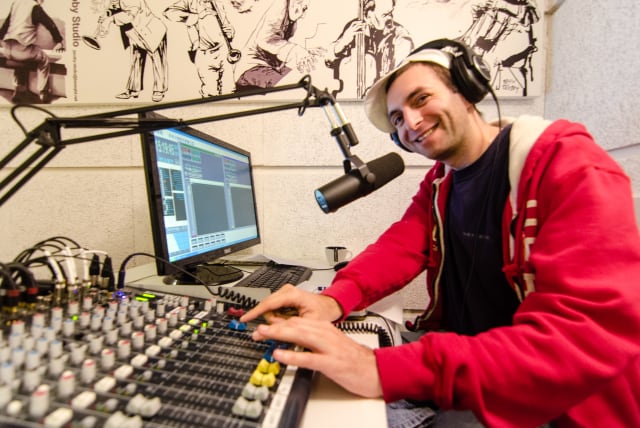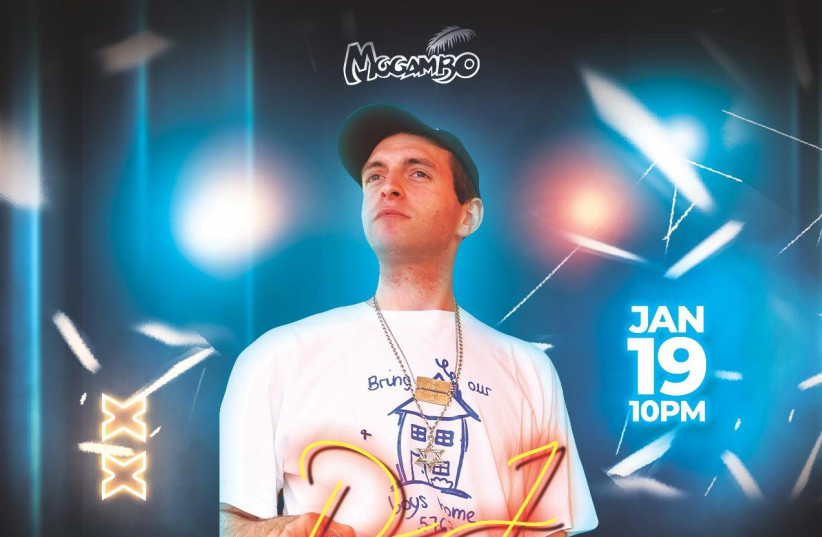DJ Antithesis: Israel's London-born master of 'Zionist Hip Hop'

Samuel Green, known as DJ Antithesis and "The Zionist Rapper" made aliyah to Tel Aviv and has released two EPs and multiple singles.
Samuel Green has done many crazy things to make it to Israel and continue to survive and even thrive in Israel these past 13 years.
His long, unconventional CV – which puts him in sharp contrast with the young bankers, engineers and start-up professionals who mainly populate his Tel Aviv Modern Orthodox synagogue – includes such jobs as spinning Israeli tunes on Kol Cambridge (the UK’s first and only radio show dedicated to Israeli and Jewish music) and at a club and in Tokyo, as well as rapping in front of 40,000 people in London. Green, also known as “The Zionist Rapper,” has released two EPs and multiple singles in his self-proclaimed “Zionist Hip Hop” style.
Green is also an accomplished writer, husband, father of two young children, and tour guide. His clients include senior business leaders, academics, religious leaders, politicians, journalists and celebrities, including Maroon 5 and their lead singer Adam Levine; Alanis Morissette; One Republic; The Kooks; and actress Amber Heard. In addition, Green was instrumental in helping to bring the famous Swiffer sweeping, mopping, and dusting cleaning system to the Holy Land.
The start of a love for Israel
Green’s love for Israel started in his days in Kingston, Southwest London. “Israel played a big piece growing up,” Green reports, noting a strong Zionist connection. Despite his involvement with FZY (Federation of Zionist Youth) while growing up, he, perhaps ironically, fell in love with all things Japanese after seeing a documentary about Japan and viewing the film Karate Kid. In high school, Green elected to study Japanese when it was offered, as he intended to study it at Cambridge University. Conveniently and perhaps curiously, the faculties of Japanese and Hebrew were both housed within the Oriental Studies Department.
Once at Cambridge, Green missed Israel and continued to look back fondly on his FZY days, thus switching his focus to Hebrew. “A lot of people were puzzled by that decision. That included my parents,” reports Green reflectively and philosophically in the thick English accent which remains after 13 years in Israel. “Some decisions go against the grain. Deep down, I knew what I wanted.”
GREEN’S STRONG connection to Israel includes a lifelong love of Israeli music. He has shared this love with audiences around the world through a series of online programs. He first started playing Israeli music by venturing into the world of rap music. Green was an early user of the online format. “My father worked for the phone company, and we had a DSL line before most others. I hosted a rap show for a year.”
Green hoped to continue the rap show at Cambridge University, but he was too late. “There was already a rap show. I knew a little about Israeli music, and there was no place to get it online.” While Green was excited about the possibility of sharing his love for Israeli music with a wider audience, he knew he might face some resistance to the idea. “It was the middle of the Second Intifada and the station was a bit nervous.” Nonetheless, in 2005 he was given the green light. “In the first week, we had more listeners than for any other show.” When the slot that followed the show opened up, Green asked and was given permission to expand it to two hours.
Green’s charm, passion, advocacy and creativity helped him land “a lot of Israeli big names” as guests on his show. He tracked down contact information and simply picked up the phone and called famous Israelis. “I would sometimes call and pose as my own assistant!” As a result of his creative strategy, Green landed such well-known Israelis as David Broza, Shiri Maimon, Subliminal, Mook E, Mosh Ben-Ari, and Shotei HaNevua
The program soon found its way to iTunes. “We were the only Israeli program on iTunes at the time. We had thousands of fans from around the world – from the Amazon jungle to Singapore to Australia and the US!” Despite the show’s popularity (the program was nominated in the Best Specialist Music Programming category of the BBC Student Radio Awards) and Green’s passion, it petered out upon his graduation from university as his work shifted to other Zionist pursuits.
Green began working in the mazkirut (directorship) of his Zionist youth movement and thinking more seriously about making aliyah. He realized that living in Israel would require a means of supporting himself, and he hatched a plan. “I would apply for a job with an international company – with offices in Israel – and try to get transferred.” Green applied and was accepted for an internship in the UK with Procter and Gamble (P&G), the American multinational consumer goods corporation headquartered in Cincinnati, Ohio. He made the difficult decision to turn it down, given his commitment to his mazkirut job.
Green’s chutzpah and drive surfaced when he asked soon after if he could reapply for the internship. This time, he was accepted and worked for the company in Geneva, Switzerland. “I figured it was easier to get to Israel from Geneva.” He moved there in 2008 and started to work. When his manager in Switzerland asked him about his career goals, he replied candidly, “To get to Israel ASAP.”
Green enjoyed his time in Geneva, where he integrated into the Jewish community and helped organize events for expats. “I was having a great time,” he says, although he still hoped to be transferred to Israel once his two-year assignment had ended. However, that was not in the cards. “My manager said it wouldn’t work out to go to Israel for my second assignment. I got on the bus and was miserable. It made me realize how much I wanted to be in Israel!”
A friend in the company offered him some sage yet unconventional advice – to write to the head of the Israel office. This is when “Plan Swiffer” was hatched. When Green heard that some bigwigs from the Israel office were coming to Geneva, he set up a meeting. “I was naive about hierarchy and set up a meeting.” Green informed them of his desire to bring Swiffer to Israel and asked for their help. He also followed his friend’s advice and emailed people at the Israel office. In Israel, he met with the Swiffer team. After what turned out to be an unexpected job interview, he learned that Swiffer would soon be launched in Israel – and he received a call inviting him to come to Israel in 2010 to join the team.
Making aliyah and bringing Swiffer to Israel
Green moved quickly to take care of all necessary paperwork for making aliyah. “I did all the paperwork super-fast at the end of June and made aliyah in August.” He considers himself very fortunate. “I came with a job, with a company I was familiar with. And my new colleagues were friendly and my age.”
After a few years with P&G, it was time for a new challenge. “I thought about other options like hi-tech or government work. A friend did the tour guide course.” Green admits he did have visions of becoming a tour guide but only after he retired as a way of making some additional money. Having thought about it some more, he said, “Why wait?” With that, he enrolled in the Hebrew course, which he completed in 2014. “I had a wonderful time on the course, and it was very good for my Hebrew,” he explains.
“I was fortunate – I jumped in and got slightly better work,” he notes, thanks in large part to the many connections he made through his years at P&G. He began leading tours for business school groups and business executives. “One thing led to another. And then I was guiding bands and people in the entertainment world, business and politics.” Green loves guiding all types of people and groups. “Everyone is interesting and has a story,” he asserts.
Green appears to be a master at juggling the many professional and personal opportunities that simultaneously come his way. He smiles as he reports, “I met my wife, Bat Chen, at a house party in Holon,” though they quickly realized that she had recently been at a Hanukkah party in his home! The two married in December 2012.
While on the tour guiding course, another interesting opportunity came his way. “In 2013, I got a call from people who were setting up a radio station in English. I don’t know how they heard about me, but they wanted to talk to me about doing an Israeli music show. I went in and made a demo. It was so much fun to be doing that. It went well. They said they wanted me to open the whole station, the whole broadcast. So we brought the station back live, then it moved to more of a podcast format,” he says.
GREEN RECOUNTS many exciting developments that took place between becoming a tour guide and (somewhat) settling down to family life:
“Along the way, I had a kid – a girl [Ella] in 2017. And 2020 was quite a seminal year – I think for a whole load of us. Things happened both in terms of the radio and the guiding [no guiding due to the pandemic]. In January 2020, we were celebrating 15 years of the Kol Cambridge show. I put a lot of work into it and came in to do the show. The station manager, who is a lovely guy, said, ‘I have bad news – we will have to stop doing the show.’ He explained that costs and licensing issues with Spotify contributed to the decision.” Green laments.
Green remained determined to find a way to keep the radio program alive. He suggested renting out the studio when not in use and finding a way to have listeners support the program. “We haven’t had much luck with crowdfunding,” the station manager replied. “How much would it cost? Let me ask around and give it a try.” Green was successful in his search for backers. The show was up and running in April 2020 after only a month-long hiatus. “It was even more special to run the show crowdfunded – it means a lot to the people. It is nice to know it matters to them. We are creating a community of listeners. I correspond with them.”
Green continues to support his family with a range of jobs. He has a blog (myisraeliguide.com), writes content for various tour companies, and since 2020 has managed a team of writers in his role as copywriting lead at the company Artist in the music space.
“I guide when I can – on evenings and weekends. I still love doing it,” he says. “I had a second kid [Yonaton], and [the fact that I have] a job where I am home most of the time is deeply appreciated by my wife!” His parents made aliyah during the pandemic and live nearby. Green still does a podcast once a week.
Despite his mostly settled lifestyle, Green occasionally gets an idea in his head that he just can’t let go. “I still have a love affair with Japan, and I try to get back there from time to time to keep the language going. I spent two months in Asia on our honeymoon, and I had planned a trip for 2020. It would have been my sixth trip. I had to postpone it due to COVID, which was upsetting.” But Green could not let the idea go. “Things started wearing in my brain – of going to Tokyo and playing for listeners there. The question was how to make it happen?” Green knows himself well. “When I get an idea in my head, I am like a dog with a bone. I just keep going!”
Green wrote to every contact he could think of in Tokyo, including friends, the Israeli Embassy and a rabbi in Tokyo who was friends with a rabbi friend in Tel Aviv. “Eventually, something panned out.” All of that legwork turned out to be unnecessary. “I received an invitation from my patron to perform in Tokyo!” Together, they explored venues, and Green had the opportunity to play at a small club in Tokyo on January 19, 2023. “I hadn’t DJ’d in a bar or club since I was in college. I had to get equipment, a little travel mixing deck, and download the software. A friend came from New York to teach me,” he adds. “Every night for two weeks, I’d DJ every night for myself so I wouldn’t make a fool of myself.” He didn’t. “We had a respectable turnout of 30 or 40. To the best of my knowledge, it is the biggest Israeli music event ever held in Japan, though I can’t confirm that.”
DJ Antithesis, who got his name while in FZY from a friend who said, “You are the antithesis of a rapper,” is doing his part to keep Israeli music alive and well in Tel Aviv, Tokyo, and around the world. ■
Samuel Green aka DJ Antithesis From London to Geneva to Tel Aviv, 2010
Jerusalem Post Store
`; document.getElementById("linkPremium").innerHTML = cont; var divWithLink = document.getElementById("premium-link"); if (divWithLink !== null && divWithLink !== 'undefined') { divWithLink.style.border = "solid 1px #cb0f3e"; divWithLink.style.textAlign = "center"; divWithLink.style.marginBottom = "15px"; divWithLink.style.marginTop = "15px"; divWithLink.style.width = "100%"; divWithLink.style.backgroundColor = "#122952"; divWithLink.style.color = "#ffffff"; divWithLink.style.lineHeight = "1.5"; } } (function (v, i) { });


